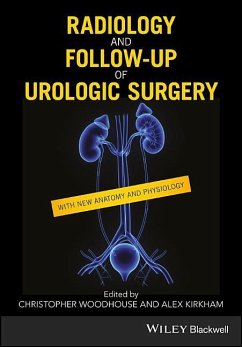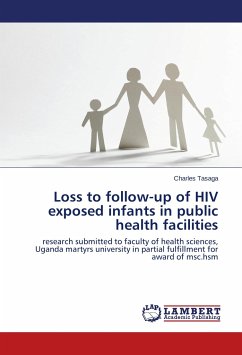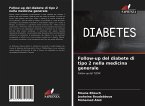Radiology and Follow-Up of Urologic Surgery
Herausgeber: Woodhouse, Christopher R J; Kirkham, Alex
Radiology and Follow-Up of Urologic Surgery
Herausgeber: Woodhouse, Christopher R J; Kirkham, Alex
- Gebundenes Buch
- Merkliste
- Auf die Merkliste
- Bewerten Bewerten
- Teilen
- Produkt teilen
- Produkterinnerung
- Produkterinnerung
The first guide to identifying and assessing changes following urologic surgery--with follow-up protocols What is the normal appearance of a kidney after radio frequency ablation of a tumor and what does a local recurrence look like? How does the urine flow down the ureters after a trans-uretero-ureterostomy? What is the normal appearance of the urinary tract after a cystoplasty? Most clinicians would be hard-pressed to provide answers to such fundamental questions concerning post-surgical anatomy and physiology, and equally challenged to find evidence-based information on the subject. Most of…mehr
Andere Kunden interessierten sich auch für
![Follow-up of type 2 diabetes in general practice Follow-up of type 2 diabetes in general practice]() Mouna ElleuchFollow-up of type 2 diabetes in general practice26,99 €
Mouna ElleuchFollow-up of type 2 diabetes in general practice26,99 €![Loss to follow-up of HIV exposed infants in public health facilities Loss to follow-up of HIV exposed infants in public health facilities]() Charles TasagaLoss to follow-up of HIV exposed infants in public health facilities33,99 €
Charles TasagaLoss to follow-up of HIV exposed infants in public health facilities33,99 €![Novel Topics in the Diagnosis, Treatment, and Follow-Up of Nephritis, Nephrotic Syndrome, and Nephrosis Novel Topics in the Diagnosis, Treatment, and Follow-Up of Nephritis, Nephrotic Syndrome, and Nephrosis]() Novel Topics in the Diagnosis, Treatment, and Follow-Up of Nephritis, Nephrotic Syndrome, and Nephrosis135,00 €
Novel Topics in the Diagnosis, Treatment, and Follow-Up of Nephritis, Nephrotic Syndrome, and Nephrosis135,00 €![Physician's Guide to the Diagnosis, Treatment, and Follow-Up of Inherited Metabolic Diseases Physician's Guide to the Diagnosis, Treatment, and Follow-Up of Inherited Metabolic Diseases]() Physician's Guide to the Diagnosis, Treatment, and Follow-Up of Inherited Metabolic Diseases173,99 €
Physician's Guide to the Diagnosis, Treatment, and Follow-Up of Inherited Metabolic Diseases173,99 €![Physician's Guide to the Diagnosis, Treatment, and Follow-Up of Inherited Metabolic Diseases Physician's Guide to the Diagnosis, Treatment, and Follow-Up of Inherited Metabolic Diseases]() Physician's Guide to the Diagnosis, Treatment, and Follow-Up of Inherited Metabolic Diseases127,99 €
Physician's Guide to the Diagnosis, Treatment, and Follow-Up of Inherited Metabolic Diseases127,99 €![Follow-up van type 2 diabetes in de huisartsenpraktijk Follow-up van type 2 diabetes in de huisartsenpraktijk]() Mouna ElleuchFollow-up van type 2 diabetes in de huisartsenpraktijk26,99 €
Mouna ElleuchFollow-up van type 2 diabetes in de huisartsenpraktijk26,99 €![Follow-up del diabete di tipo 2 nella medicina generale Follow-up del diabete di tipo 2 nella medicina generale]() Mouna ElleuchFollow-up del diabete di tipo 2 nella medicina generale26,99 €
Mouna ElleuchFollow-up del diabete di tipo 2 nella medicina generale26,99 €-
-
-
The first guide to identifying and assessing changes following urologic surgery--with follow-up protocols What is the normal appearance of a kidney after radio frequency ablation of a tumor and what does a local recurrence look like? How does the urine flow down the ureters after a trans-uretero-ureterostomy? What is the normal appearance of the urinary tract after a cystoplasty? Most clinicians would be hard-pressed to provide answers to such fundamental questions concerning post-surgical anatomy and physiology, and equally challenged to find evidence-based information on the subject. Most of the literature in radiology and urologic surgery is orientated towards diagnosis and disease management. Although this often includes complications and outcomes, the clinician is often in the dark as to the anatomical and physiological changes that follow successful treatment, especially in cases involving conservative or reconstructive surgery. To rectify this, the editors invited colleagues to share insights gleaned during their careers. The results are contained in Radiology and Follow-up of Urologic Surgery. Extremely well-illustrated throughout with color photographs and line drawings, Radiology and Follow-up of Urologic Surgery: * Features sections devoted to each of the organs of the genito-urinary tract with chapters covering the major diseases and operations that are used to treat them * Focuses on the "new normal" following surgery with an emphasis on the identification of normal changes versus complications * Covers the radiologic changes and biochemical and histological findings which are found following reconstructions * Offers guidelines for clinical and radiological follow up after urological surgery in some key areas Radiology and Follow-up of Urologic Surgery is essential reading for surgical residents in urology, as well as radiology residents specializing in urology. It also belongs on the reference shelves of urologists, urological surgeons, obstetric/gynecologic surgeons, and radiologists with an interest in the field, at whatever stage in their career.
Produktdetails
- Produktdetails
- Verlag: Wiley
- Seitenzahl: 240
- Erscheinungstermin: 13. November 2017
- Englisch
- Abmessung: 257mm x 180mm x 15mm
- Gewicht: 748g
- ISBN-13: 9781119162087
- ISBN-10: 1119162084
- Artikelnr.: 48514504
- Herstellerkennzeichnung
- Libri GmbH
- Europaallee 1
- 36244 Bad Hersfeld
- gpsr@libri.de
- Verlag: Wiley
- Seitenzahl: 240
- Erscheinungstermin: 13. November 2017
- Englisch
- Abmessung: 257mm x 180mm x 15mm
- Gewicht: 748g
- ISBN-13: 9781119162087
- ISBN-10: 1119162084
- Artikelnr.: 48514504
- Herstellerkennzeichnung
- Libri GmbH
- Europaallee 1
- 36244 Bad Hersfeld
- gpsr@libri.de
Christopher Woodhouse, MB, FRCS, FEBU, is an Emeritus Professor of Adolescent Urology at University College London and previously a consultant at the Royal Marsden Hospital. He trained under Sir David Innes Williams at the Institute of Urology and was made Professor of Adolescent Urology at UCL in 2006. He is widely considered as one of the world's leading experts in reconstructive urology and in particular, adolescent urology and congenital urological anomalies. Alex Kirkham, MB BCh, FRCS, FRCR, MD, is a consultant uro-radiologist at University College London Hospitals, London, UK.
List of Contributors xiii
Acknowledgements xv
Introduction 1
Christopher Woodhouse and Alex Kirkham
1 Subtotal Nephrectomy and Tumour Ablation 5
David Nicol, Alison Elstob, Christopher Anderson, and Graham Munneke
Introduction 5
Procedures 5
Partial Nephrectomy 5
Early Imaging 6
Late Imaging 7
Ablative Therapies 10
Complications 13
Successful Tumour Ablation 14
Treatment Failure 15
Surveillance 18
Follow-up Imaging 18
Partial Nephrectomy 18
Ablative Therapies 19
Surveillance 19
Conclusions 19
References 20
2 Renal Transplantation 23
Rhana H. Zakri, Giles Rottenberg, and Jonathon Olsburgh
Introduction 23
The Role of Ultrasound Imaging 23
Vascular Complications 23
Transplant Renal Artery Stenosis 23
Transplant Renal Vein Thrombosis 25
Transplant Renal Artery Thrombosis 26
Arteriovenous Fistula 27
Follow-up 27
Urological Complications 27
Ureteric Complications 28
Anastomotic Urinary Leak or Urinoma 28
Missed Duplex Transplant Ureter 29
Ureteric Stenosis 30
Transplant Ureteric Reflux 30
Bladder Complications 30
Urinary Fistulae 30
General Complications 31
Lymphocoeles 31
Renal Transplant Stone Disease 31
Renal Transplant Trauma 32
Oncological Complications 32
Transplant Renal Cell Carcinoma 32
Transplant Ureteric Transitional Cell Carcinoma 33
Conclusions 33
References 34
3 Imaging After Endo-urological Stone Treatment 37
Daron Smith and Clare Allen
Introduction 37
The Procedures 37
Conservative Management 37
Ureteric Stones: Results and Complications 41
Extracorporeal shock wave lithotripsy 41
Ureteroscopy 41
Renal Stones: Results and Complications 44
Flexible Ureterorenoscopy 44
Percutaneous Surgery 46
Complications and Follow-up 48
Residual Fragments After ESWL, URS, FURS and PCNL 48
Radiation Exposure for Patients with Stones 53
References 54
4 Pelvi-ureteric Junction Reconstruction 57
Mohamed Ismail and Hash Hashim
Introduction 57
Antenatal Hydronephrosis 57
Pathophysiological Effect of True Pelvi-ureteric Obstruction 58
Physiological and Anatomical Changes in the Kidney Following Pyeloplasty 59
Incidental PUJO in adults 61
Long-term Follow-up 62
Conclusions 63
References 64
5 Retroperitoneal Fibrosis 67
Paul Scheel and Bruce Berlanstein
Introduction 67
Available Treatments 67
Medical Therapy 67
Surgical Treatment 69
Follow-up 70
Imaging 70
Stent Removal 70
Complications 71
Stent-related Complications 71
Hydrocoeles 73
Long-term Follow-up 73
Recurrent Disease 74
References 75
6 Urinary Diversion 77
Christopher Woodhouse and Alex Kirkham
Introduction 77
The Procedures 77
Clinical Follow-up of Ileal Conduits 78
Postoperative Imaging 78
The 'Loopogram' 78
Ultrasound 81
Nephrostomy and Antegrade Imaging 83
Monitoring of Asymptomatic Patients 83
Management of Bacteriuria and Sepsis 84
References 85
7 Ureteric Reconstruction and Replacement 87
Christopher Woodhouse and Aslam Sohaib
Introduction 87
Procedures 87
Stents and Nephrostomies 87
Uretero-pyelostomy 87
Uretero-calycostomy 88
Trans-uretero-ureterostomy 88
Ureteric Re-implantation 88
Autotransplantation 90
Intestine 90
Complex Lower Urinary Tract Reconstruction 90
Other Materials and Experimental Techniques 90
Clinical Follow-up and Complications 91
Stents and Nephrostomies 91
Reconstruction with Urothelium 94
Autotransplantation 95
Intestine 96
References 98
8 Conservative and Reconstructive Bladder Surgery 101
Pardeep Kumar
Introduction 101
Extravasation 101
Bladder Perforation 101
Reconstruction Following Ureteric Injury and Partial Cystectomy 103
The Irradiated Bladder 106
Complications After Posterior Exenteration 106
Conclusions 107
References 107
9 Bladder Augmentation in Children 109
Paddy Dewan and Padma Rao
Introduction 109
The Procedures 109
Augmentation with Ileum or Colon 109
Gastrocystoplasty 109
Seromuscular Cystoplasty 109
Auto-augmentation 110
Uretero-cystoplasty 110
Clinical Follow-up 111
Postoperative Imaging 113
Complications of Enterocystoplasty 115
Metabolic and Electrolyte Disorders 115
Stones 115
Perforation 117
Neoplastic Progression 118
Unique Complications of Gastrocystoplasty 119
Hypochloraemic Metabolic Alkalosis 119
Hypergastrinaemia 119
Haematuria-Dysuria Syndrome 120
Changes Over Time 120
References 121
10 Radiology and Follow-up of the Neobladder 125
Richard Hautmann and Bjoern G. Volkmer
Introduction 125
The Procedure 125
Radical Cystectomy in Females 125
Radical Cystectomy in Males 125
The Neobladder 125
Postoperative Imaging 126
Clinical Follow-up 127
Clinical Examination 127
Bladder and Urine Investigations 128
Renal Investigations 128
Oncologic Follow-up Specific to the Neobladder 132
Local Recurrence 132
Secondary Tumour Growth in Urinary Diversions for Benign Disease 134
Complications 135
Complications up to 90 Days 135
Long-term Complications 135
Changes Over Time 136
Reservoir Control 136
Incontinence 136
Voiding Failure (Hypercontinence) 136
Metabolic Changes (see also Chapter 11) 138
References 138
11 General Consequences of Lower Urinary Tract Replacement and
Reconstruction 141
Christopher Woodhouse and Alex Kirkham
Introduction 141
Reservoirs 141
The Stomach 141
Ileum 141
Gastrointestinal Consequences 141
Storage Consequences 143
Colon 143
Gastrointestinal Consequences 143
Storage Consequences 143
Rectum 145
Continence (Mainz II) 146
Anastomotic Cancer 147
Urodynamic Findings 149
Stones 149
Renal Function 151
Perforation 151
Histological Changes 153
Infection 155
Neoplasia 156
Urine Testing for Pregnancy 157
The Conduit and Continence 157
References 158
12 Surgery on the Benign Prostate 163
Doug Pendse and Mark R. Feneley
Introduction 163
Procedures 163
Outcomes and Complications 165
Postoperative Failure to Void 166
Continued Failure to Void or Unsatisfactory Voiding 166
Sexual Function 168
Incontinence 170
Stricture 170
Unexpected Malignancy 171
Changes Over Time 171
References 172
13 Imaging After Treatment of Prostate Cancer 177
Alex Kirkham
Introduction 177
Appearances After Radical Prostatectomy 177
Residual Tumour After Radical Prostatectomy 179
The Prostate After Ablative Therapies 179
Early Appearances 180
Early Complications 181
Appearances at 2-5 Months 182
Appearances at 6 Months: Assessing Residual and Recurrent Tumour 182
Nuclear Medicine Studies 184
A Schedule for Follow-up 184
References 184
14 Urethroplasty 189
Simon Bugeja, Clare Allen, and Daniella E. Andrich
Introduction 189
Pericatheter Urethrogram 189
Ascending and Descending Urethrography 190
Radiological Appearance After Different Types of Urethroplasty 191
Traumatic Strictures 192
Idiopathic Bulbar Strictures 193
Penile Urethroplasty 193
Use of Ultrasound in Urethroplasty Follow-up 194
Follow-up After Urethroplasty 196
Radiological Appearance and Surgical Management of Recurrent Strictures
After Urethroplasty 197
References 198
15 The Postoperative Appearance and Follow-up of Urinary Tract Prostheses
201
Alex Kirkham
Introduction 201
Penile Prostheses 201
Normal Appearance and Imaging Techniques 201
Problems of Positioning and Length 203
Artificial Urinary Sphincters 204
Disorders of Function and Position 205
InfectioninImplantedDevices 206
Metallic Stents 208
References 208
Index 211
Acknowledgements xv
Introduction 1
Christopher Woodhouse and Alex Kirkham
1 Subtotal Nephrectomy and Tumour Ablation 5
David Nicol, Alison Elstob, Christopher Anderson, and Graham Munneke
Introduction 5
Procedures 5
Partial Nephrectomy 5
Early Imaging 6
Late Imaging 7
Ablative Therapies 10
Complications 13
Successful Tumour Ablation 14
Treatment Failure 15
Surveillance 18
Follow-up Imaging 18
Partial Nephrectomy 18
Ablative Therapies 19
Surveillance 19
Conclusions 19
References 20
2 Renal Transplantation 23
Rhana H. Zakri, Giles Rottenberg, and Jonathon Olsburgh
Introduction 23
The Role of Ultrasound Imaging 23
Vascular Complications 23
Transplant Renal Artery Stenosis 23
Transplant Renal Vein Thrombosis 25
Transplant Renal Artery Thrombosis 26
Arteriovenous Fistula 27
Follow-up 27
Urological Complications 27
Ureteric Complications 28
Anastomotic Urinary Leak or Urinoma 28
Missed Duplex Transplant Ureter 29
Ureteric Stenosis 30
Transplant Ureteric Reflux 30
Bladder Complications 30
Urinary Fistulae 30
General Complications 31
Lymphocoeles 31
Renal Transplant Stone Disease 31
Renal Transplant Trauma 32
Oncological Complications 32
Transplant Renal Cell Carcinoma 32
Transplant Ureteric Transitional Cell Carcinoma 33
Conclusions 33
References 34
3 Imaging After Endo-urological Stone Treatment 37
Daron Smith and Clare Allen
Introduction 37
The Procedures 37
Conservative Management 37
Ureteric Stones: Results and Complications 41
Extracorporeal shock wave lithotripsy 41
Ureteroscopy 41
Renal Stones: Results and Complications 44
Flexible Ureterorenoscopy 44
Percutaneous Surgery 46
Complications and Follow-up 48
Residual Fragments After ESWL, URS, FURS and PCNL 48
Radiation Exposure for Patients with Stones 53
References 54
4 Pelvi-ureteric Junction Reconstruction 57
Mohamed Ismail and Hash Hashim
Introduction 57
Antenatal Hydronephrosis 57
Pathophysiological Effect of True Pelvi-ureteric Obstruction 58
Physiological and Anatomical Changes in the Kidney Following Pyeloplasty 59
Incidental PUJO in adults 61
Long-term Follow-up 62
Conclusions 63
References 64
5 Retroperitoneal Fibrosis 67
Paul Scheel and Bruce Berlanstein
Introduction 67
Available Treatments 67
Medical Therapy 67
Surgical Treatment 69
Follow-up 70
Imaging 70
Stent Removal 70
Complications 71
Stent-related Complications 71
Hydrocoeles 73
Long-term Follow-up 73
Recurrent Disease 74
References 75
6 Urinary Diversion 77
Christopher Woodhouse and Alex Kirkham
Introduction 77
The Procedures 77
Clinical Follow-up of Ileal Conduits 78
Postoperative Imaging 78
The 'Loopogram' 78
Ultrasound 81
Nephrostomy and Antegrade Imaging 83
Monitoring of Asymptomatic Patients 83
Management of Bacteriuria and Sepsis 84
References 85
7 Ureteric Reconstruction and Replacement 87
Christopher Woodhouse and Aslam Sohaib
Introduction 87
Procedures 87
Stents and Nephrostomies 87
Uretero-pyelostomy 87
Uretero-calycostomy 88
Trans-uretero-ureterostomy 88
Ureteric Re-implantation 88
Autotransplantation 90
Intestine 90
Complex Lower Urinary Tract Reconstruction 90
Other Materials and Experimental Techniques 90
Clinical Follow-up and Complications 91
Stents and Nephrostomies 91
Reconstruction with Urothelium 94
Autotransplantation 95
Intestine 96
References 98
8 Conservative and Reconstructive Bladder Surgery 101
Pardeep Kumar
Introduction 101
Extravasation 101
Bladder Perforation 101
Reconstruction Following Ureteric Injury and Partial Cystectomy 103
The Irradiated Bladder 106
Complications After Posterior Exenteration 106
Conclusions 107
References 107
9 Bladder Augmentation in Children 109
Paddy Dewan and Padma Rao
Introduction 109
The Procedures 109
Augmentation with Ileum or Colon 109
Gastrocystoplasty 109
Seromuscular Cystoplasty 109
Auto-augmentation 110
Uretero-cystoplasty 110
Clinical Follow-up 111
Postoperative Imaging 113
Complications of Enterocystoplasty 115
Metabolic and Electrolyte Disorders 115
Stones 115
Perforation 117
Neoplastic Progression 118
Unique Complications of Gastrocystoplasty 119
Hypochloraemic Metabolic Alkalosis 119
Hypergastrinaemia 119
Haematuria-Dysuria Syndrome 120
Changes Over Time 120
References 121
10 Radiology and Follow-up of the Neobladder 125
Richard Hautmann and Bjoern G. Volkmer
Introduction 125
The Procedure 125
Radical Cystectomy in Females 125
Radical Cystectomy in Males 125
The Neobladder 125
Postoperative Imaging 126
Clinical Follow-up 127
Clinical Examination 127
Bladder and Urine Investigations 128
Renal Investigations 128
Oncologic Follow-up Specific to the Neobladder 132
Local Recurrence 132
Secondary Tumour Growth in Urinary Diversions for Benign Disease 134
Complications 135
Complications up to 90 Days 135
Long-term Complications 135
Changes Over Time 136
Reservoir Control 136
Incontinence 136
Voiding Failure (Hypercontinence) 136
Metabolic Changes (see also Chapter 11) 138
References 138
11 General Consequences of Lower Urinary Tract Replacement and
Reconstruction 141
Christopher Woodhouse and Alex Kirkham
Introduction 141
Reservoirs 141
The Stomach 141
Ileum 141
Gastrointestinal Consequences 141
Storage Consequences 143
Colon 143
Gastrointestinal Consequences 143
Storage Consequences 143
Rectum 145
Continence (Mainz II) 146
Anastomotic Cancer 147
Urodynamic Findings 149
Stones 149
Renal Function 151
Perforation 151
Histological Changes 153
Infection 155
Neoplasia 156
Urine Testing for Pregnancy 157
The Conduit and Continence 157
References 158
12 Surgery on the Benign Prostate 163
Doug Pendse and Mark R. Feneley
Introduction 163
Procedures 163
Outcomes and Complications 165
Postoperative Failure to Void 166
Continued Failure to Void or Unsatisfactory Voiding 166
Sexual Function 168
Incontinence 170
Stricture 170
Unexpected Malignancy 171
Changes Over Time 171
References 172
13 Imaging After Treatment of Prostate Cancer 177
Alex Kirkham
Introduction 177
Appearances After Radical Prostatectomy 177
Residual Tumour After Radical Prostatectomy 179
The Prostate After Ablative Therapies 179
Early Appearances 180
Early Complications 181
Appearances at 2-5 Months 182
Appearances at 6 Months: Assessing Residual and Recurrent Tumour 182
Nuclear Medicine Studies 184
A Schedule for Follow-up 184
References 184
14 Urethroplasty 189
Simon Bugeja, Clare Allen, and Daniella E. Andrich
Introduction 189
Pericatheter Urethrogram 189
Ascending and Descending Urethrography 190
Radiological Appearance After Different Types of Urethroplasty 191
Traumatic Strictures 192
Idiopathic Bulbar Strictures 193
Penile Urethroplasty 193
Use of Ultrasound in Urethroplasty Follow-up 194
Follow-up After Urethroplasty 196
Radiological Appearance and Surgical Management of Recurrent Strictures
After Urethroplasty 197
References 198
15 The Postoperative Appearance and Follow-up of Urinary Tract Prostheses
201
Alex Kirkham
Introduction 201
Penile Prostheses 201
Normal Appearance and Imaging Techniques 201
Problems of Positioning and Length 203
Artificial Urinary Sphincters 204
Disorders of Function and Position 205
InfectioninImplantedDevices 206
Metallic Stents 208
References 208
Index 211
List of Contributors xiii
Acknowledgements xv
Introduction 1
Christopher Woodhouse and Alex Kirkham
1 Subtotal Nephrectomy and Tumour Ablation 5
David Nicol, Alison Elstob, Christopher Anderson, and Graham Munneke
Introduction 5
Procedures 5
Partial Nephrectomy 5
Early Imaging 6
Late Imaging 7
Ablative Therapies 10
Complications 13
Successful Tumour Ablation 14
Treatment Failure 15
Surveillance 18
Follow-up Imaging 18
Partial Nephrectomy 18
Ablative Therapies 19
Surveillance 19
Conclusions 19
References 20
2 Renal Transplantation 23
Rhana H. Zakri, Giles Rottenberg, and Jonathon Olsburgh
Introduction 23
The Role of Ultrasound Imaging 23
Vascular Complications 23
Transplant Renal Artery Stenosis 23
Transplant Renal Vein Thrombosis 25
Transplant Renal Artery Thrombosis 26
Arteriovenous Fistula 27
Follow-up 27
Urological Complications 27
Ureteric Complications 28
Anastomotic Urinary Leak or Urinoma 28
Missed Duplex Transplant Ureter 29
Ureteric Stenosis 30
Transplant Ureteric Reflux 30
Bladder Complications 30
Urinary Fistulae 30
General Complications 31
Lymphocoeles 31
Renal Transplant Stone Disease 31
Renal Transplant Trauma 32
Oncological Complications 32
Transplant Renal Cell Carcinoma 32
Transplant Ureteric Transitional Cell Carcinoma 33
Conclusions 33
References 34
3 Imaging After Endo-urological Stone Treatment 37
Daron Smith and Clare Allen
Introduction 37
The Procedures 37
Conservative Management 37
Ureteric Stones: Results and Complications 41
Extracorporeal shock wave lithotripsy 41
Ureteroscopy 41
Renal Stones: Results and Complications 44
Flexible Ureterorenoscopy 44
Percutaneous Surgery 46
Complications and Follow-up 48
Residual Fragments After ESWL, URS, FURS and PCNL 48
Radiation Exposure for Patients with Stones 53
References 54
4 Pelvi-ureteric Junction Reconstruction 57
Mohamed Ismail and Hash Hashim
Introduction 57
Antenatal Hydronephrosis 57
Pathophysiological Effect of True Pelvi-ureteric Obstruction 58
Physiological and Anatomical Changes in the Kidney Following Pyeloplasty 59
Incidental PUJO in adults 61
Long-term Follow-up 62
Conclusions 63
References 64
5 Retroperitoneal Fibrosis 67
Paul Scheel and Bruce Berlanstein
Introduction 67
Available Treatments 67
Medical Therapy 67
Surgical Treatment 69
Follow-up 70
Imaging 70
Stent Removal 70
Complications 71
Stent-related Complications 71
Hydrocoeles 73
Long-term Follow-up 73
Recurrent Disease 74
References 75
6 Urinary Diversion 77
Christopher Woodhouse and Alex Kirkham
Introduction 77
The Procedures 77
Clinical Follow-up of Ileal Conduits 78
Postoperative Imaging 78
The 'Loopogram' 78
Ultrasound 81
Nephrostomy and Antegrade Imaging 83
Monitoring of Asymptomatic Patients 83
Management of Bacteriuria and Sepsis 84
References 85
7 Ureteric Reconstruction and Replacement 87
Christopher Woodhouse and Aslam Sohaib
Introduction 87
Procedures 87
Stents and Nephrostomies 87
Uretero-pyelostomy 87
Uretero-calycostomy 88
Trans-uretero-ureterostomy 88
Ureteric Re-implantation 88
Autotransplantation 90
Intestine 90
Complex Lower Urinary Tract Reconstruction 90
Other Materials and Experimental Techniques 90
Clinical Follow-up and Complications 91
Stents and Nephrostomies 91
Reconstruction with Urothelium 94
Autotransplantation 95
Intestine 96
References 98
8 Conservative and Reconstructive Bladder Surgery 101
Pardeep Kumar
Introduction 101
Extravasation 101
Bladder Perforation 101
Reconstruction Following Ureteric Injury and Partial Cystectomy 103
The Irradiated Bladder 106
Complications After Posterior Exenteration 106
Conclusions 107
References 107
9 Bladder Augmentation in Children 109
Paddy Dewan and Padma Rao
Introduction 109
The Procedures 109
Augmentation with Ileum or Colon 109
Gastrocystoplasty 109
Seromuscular Cystoplasty 109
Auto-augmentation 110
Uretero-cystoplasty 110
Clinical Follow-up 111
Postoperative Imaging 113
Complications of Enterocystoplasty 115
Metabolic and Electrolyte Disorders 115
Stones 115
Perforation 117
Neoplastic Progression 118
Unique Complications of Gastrocystoplasty 119
Hypochloraemic Metabolic Alkalosis 119
Hypergastrinaemia 119
Haematuria-Dysuria Syndrome 120
Changes Over Time 120
References 121
10 Radiology and Follow-up of the Neobladder 125
Richard Hautmann and Bjoern G. Volkmer
Introduction 125
The Procedure 125
Radical Cystectomy in Females 125
Radical Cystectomy in Males 125
The Neobladder 125
Postoperative Imaging 126
Clinical Follow-up 127
Clinical Examination 127
Bladder and Urine Investigations 128
Renal Investigations 128
Oncologic Follow-up Specific to the Neobladder 132
Local Recurrence 132
Secondary Tumour Growth in Urinary Diversions for Benign Disease 134
Complications 135
Complications up to 90 Days 135
Long-term Complications 135
Changes Over Time 136
Reservoir Control 136
Incontinence 136
Voiding Failure (Hypercontinence) 136
Metabolic Changes (see also Chapter 11) 138
References 138
11 General Consequences of Lower Urinary Tract Replacement and
Reconstruction 141
Christopher Woodhouse and Alex Kirkham
Introduction 141
Reservoirs 141
The Stomach 141
Ileum 141
Gastrointestinal Consequences 141
Storage Consequences 143
Colon 143
Gastrointestinal Consequences 143
Storage Consequences 143
Rectum 145
Continence (Mainz II) 146
Anastomotic Cancer 147
Urodynamic Findings 149
Stones 149
Renal Function 151
Perforation 151
Histological Changes 153
Infection 155
Neoplasia 156
Urine Testing for Pregnancy 157
The Conduit and Continence 157
References 158
12 Surgery on the Benign Prostate 163
Doug Pendse and Mark R. Feneley
Introduction 163
Procedures 163
Outcomes and Complications 165
Postoperative Failure to Void 166
Continued Failure to Void or Unsatisfactory Voiding 166
Sexual Function 168
Incontinence 170
Stricture 170
Unexpected Malignancy 171
Changes Over Time 171
References 172
13 Imaging After Treatment of Prostate Cancer 177
Alex Kirkham
Introduction 177
Appearances After Radical Prostatectomy 177
Residual Tumour After Radical Prostatectomy 179
The Prostate After Ablative Therapies 179
Early Appearances 180
Early Complications 181
Appearances at 2-5 Months 182
Appearances at 6 Months: Assessing Residual and Recurrent Tumour 182
Nuclear Medicine Studies 184
A Schedule for Follow-up 184
References 184
14 Urethroplasty 189
Simon Bugeja, Clare Allen, and Daniella E. Andrich
Introduction 189
Pericatheter Urethrogram 189
Ascending and Descending Urethrography 190
Radiological Appearance After Different Types of Urethroplasty 191
Traumatic Strictures 192
Idiopathic Bulbar Strictures 193
Penile Urethroplasty 193
Use of Ultrasound in Urethroplasty Follow-up 194
Follow-up After Urethroplasty 196
Radiological Appearance and Surgical Management of Recurrent Strictures
After Urethroplasty 197
References 198
15 The Postoperative Appearance and Follow-up of Urinary Tract Prostheses
201
Alex Kirkham
Introduction 201
Penile Prostheses 201
Normal Appearance and Imaging Techniques 201
Problems of Positioning and Length 203
Artificial Urinary Sphincters 204
Disorders of Function and Position 205
InfectioninImplantedDevices 206
Metallic Stents 208
References 208
Index 211
Acknowledgements xv
Introduction 1
Christopher Woodhouse and Alex Kirkham
1 Subtotal Nephrectomy and Tumour Ablation 5
David Nicol, Alison Elstob, Christopher Anderson, and Graham Munneke
Introduction 5
Procedures 5
Partial Nephrectomy 5
Early Imaging 6
Late Imaging 7
Ablative Therapies 10
Complications 13
Successful Tumour Ablation 14
Treatment Failure 15
Surveillance 18
Follow-up Imaging 18
Partial Nephrectomy 18
Ablative Therapies 19
Surveillance 19
Conclusions 19
References 20
2 Renal Transplantation 23
Rhana H. Zakri, Giles Rottenberg, and Jonathon Olsburgh
Introduction 23
The Role of Ultrasound Imaging 23
Vascular Complications 23
Transplant Renal Artery Stenosis 23
Transplant Renal Vein Thrombosis 25
Transplant Renal Artery Thrombosis 26
Arteriovenous Fistula 27
Follow-up 27
Urological Complications 27
Ureteric Complications 28
Anastomotic Urinary Leak or Urinoma 28
Missed Duplex Transplant Ureter 29
Ureteric Stenosis 30
Transplant Ureteric Reflux 30
Bladder Complications 30
Urinary Fistulae 30
General Complications 31
Lymphocoeles 31
Renal Transplant Stone Disease 31
Renal Transplant Trauma 32
Oncological Complications 32
Transplant Renal Cell Carcinoma 32
Transplant Ureteric Transitional Cell Carcinoma 33
Conclusions 33
References 34
3 Imaging After Endo-urological Stone Treatment 37
Daron Smith and Clare Allen
Introduction 37
The Procedures 37
Conservative Management 37
Ureteric Stones: Results and Complications 41
Extracorporeal shock wave lithotripsy 41
Ureteroscopy 41
Renal Stones: Results and Complications 44
Flexible Ureterorenoscopy 44
Percutaneous Surgery 46
Complications and Follow-up 48
Residual Fragments After ESWL, URS, FURS and PCNL 48
Radiation Exposure for Patients with Stones 53
References 54
4 Pelvi-ureteric Junction Reconstruction 57
Mohamed Ismail and Hash Hashim
Introduction 57
Antenatal Hydronephrosis 57
Pathophysiological Effect of True Pelvi-ureteric Obstruction 58
Physiological and Anatomical Changes in the Kidney Following Pyeloplasty 59
Incidental PUJO in adults 61
Long-term Follow-up 62
Conclusions 63
References 64
5 Retroperitoneal Fibrosis 67
Paul Scheel and Bruce Berlanstein
Introduction 67
Available Treatments 67
Medical Therapy 67
Surgical Treatment 69
Follow-up 70
Imaging 70
Stent Removal 70
Complications 71
Stent-related Complications 71
Hydrocoeles 73
Long-term Follow-up 73
Recurrent Disease 74
References 75
6 Urinary Diversion 77
Christopher Woodhouse and Alex Kirkham
Introduction 77
The Procedures 77
Clinical Follow-up of Ileal Conduits 78
Postoperative Imaging 78
The 'Loopogram' 78
Ultrasound 81
Nephrostomy and Antegrade Imaging 83
Monitoring of Asymptomatic Patients 83
Management of Bacteriuria and Sepsis 84
References 85
7 Ureteric Reconstruction and Replacement 87
Christopher Woodhouse and Aslam Sohaib
Introduction 87
Procedures 87
Stents and Nephrostomies 87
Uretero-pyelostomy 87
Uretero-calycostomy 88
Trans-uretero-ureterostomy 88
Ureteric Re-implantation 88
Autotransplantation 90
Intestine 90
Complex Lower Urinary Tract Reconstruction 90
Other Materials and Experimental Techniques 90
Clinical Follow-up and Complications 91
Stents and Nephrostomies 91
Reconstruction with Urothelium 94
Autotransplantation 95
Intestine 96
References 98
8 Conservative and Reconstructive Bladder Surgery 101
Pardeep Kumar
Introduction 101
Extravasation 101
Bladder Perforation 101
Reconstruction Following Ureteric Injury and Partial Cystectomy 103
The Irradiated Bladder 106
Complications After Posterior Exenteration 106
Conclusions 107
References 107
9 Bladder Augmentation in Children 109
Paddy Dewan and Padma Rao
Introduction 109
The Procedures 109
Augmentation with Ileum or Colon 109
Gastrocystoplasty 109
Seromuscular Cystoplasty 109
Auto-augmentation 110
Uretero-cystoplasty 110
Clinical Follow-up 111
Postoperative Imaging 113
Complications of Enterocystoplasty 115
Metabolic and Electrolyte Disorders 115
Stones 115
Perforation 117
Neoplastic Progression 118
Unique Complications of Gastrocystoplasty 119
Hypochloraemic Metabolic Alkalosis 119
Hypergastrinaemia 119
Haematuria-Dysuria Syndrome 120
Changes Over Time 120
References 121
10 Radiology and Follow-up of the Neobladder 125
Richard Hautmann and Bjoern G. Volkmer
Introduction 125
The Procedure 125
Radical Cystectomy in Females 125
Radical Cystectomy in Males 125
The Neobladder 125
Postoperative Imaging 126
Clinical Follow-up 127
Clinical Examination 127
Bladder and Urine Investigations 128
Renal Investigations 128
Oncologic Follow-up Specific to the Neobladder 132
Local Recurrence 132
Secondary Tumour Growth in Urinary Diversions for Benign Disease 134
Complications 135
Complications up to 90 Days 135
Long-term Complications 135
Changes Over Time 136
Reservoir Control 136
Incontinence 136
Voiding Failure (Hypercontinence) 136
Metabolic Changes (see also Chapter 11) 138
References 138
11 General Consequences of Lower Urinary Tract Replacement and
Reconstruction 141
Christopher Woodhouse and Alex Kirkham
Introduction 141
Reservoirs 141
The Stomach 141
Ileum 141
Gastrointestinal Consequences 141
Storage Consequences 143
Colon 143
Gastrointestinal Consequences 143
Storage Consequences 143
Rectum 145
Continence (Mainz II) 146
Anastomotic Cancer 147
Urodynamic Findings 149
Stones 149
Renal Function 151
Perforation 151
Histological Changes 153
Infection 155
Neoplasia 156
Urine Testing for Pregnancy 157
The Conduit and Continence 157
References 158
12 Surgery on the Benign Prostate 163
Doug Pendse and Mark R. Feneley
Introduction 163
Procedures 163
Outcomes and Complications 165
Postoperative Failure to Void 166
Continued Failure to Void or Unsatisfactory Voiding 166
Sexual Function 168
Incontinence 170
Stricture 170
Unexpected Malignancy 171
Changes Over Time 171
References 172
13 Imaging After Treatment of Prostate Cancer 177
Alex Kirkham
Introduction 177
Appearances After Radical Prostatectomy 177
Residual Tumour After Radical Prostatectomy 179
The Prostate After Ablative Therapies 179
Early Appearances 180
Early Complications 181
Appearances at 2-5 Months 182
Appearances at 6 Months: Assessing Residual and Recurrent Tumour 182
Nuclear Medicine Studies 184
A Schedule for Follow-up 184
References 184
14 Urethroplasty 189
Simon Bugeja, Clare Allen, and Daniella E. Andrich
Introduction 189
Pericatheter Urethrogram 189
Ascending and Descending Urethrography 190
Radiological Appearance After Different Types of Urethroplasty 191
Traumatic Strictures 192
Idiopathic Bulbar Strictures 193
Penile Urethroplasty 193
Use of Ultrasound in Urethroplasty Follow-up 194
Follow-up After Urethroplasty 196
Radiological Appearance and Surgical Management of Recurrent Strictures
After Urethroplasty 197
References 198
15 The Postoperative Appearance and Follow-up of Urinary Tract Prostheses
201
Alex Kirkham
Introduction 201
Penile Prostheses 201
Normal Appearance and Imaging Techniques 201
Problems of Positioning and Length 203
Artificial Urinary Sphincters 204
Disorders of Function and Position 205
InfectioninImplantedDevices 206
Metallic Stents 208
References 208
Index 211








